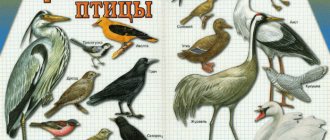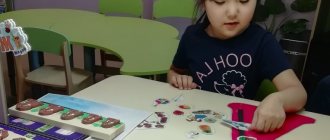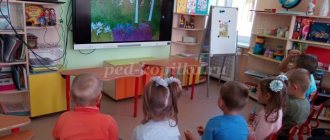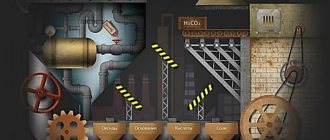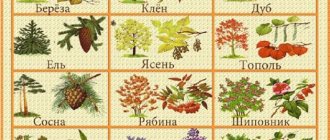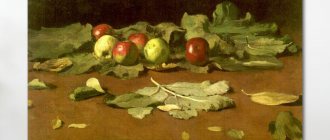Didactic games for preschoolers 4-6 years old on the topic: Fruits, vegetables, berries
Didactic games for preschoolers on the topic: “Fruits, vegetables, berries”
Author: Knis Anna Nikolaevna, senior teacher. Place of work: MBDOU “Kindergarten No. 3 “Smile”, Kalach - on - Don. Description of work: I bring to your attention didactic games for preschoolers on the topic: “Fruits, vegetables, berries.” This material will help educators, children and their parents consolidate children's knowledge about fruits, vegetables and berries in a playful way. Didactic game “The fifth odd one” Goal: Development of skills to classify objects according to essential characteristics, consolidation of generalization words. Didactic material: Cards depicting five objects, four of them belong to one thematic group, and the fifth to some other group. Progress of the game: Children are given the task: “Look at the pictures, name what is depicted on them and determine which object is superfluous. Name the remaining items in one word.” Each participant eliminates the extra item in turn. If he makes a mistake or does not complete the task, his version is offered to the next player to complete. For each correctly completed task they give a chip. The one who collects the most chips wins. Cards for the game: 1. Strawberry, raspberry, kiwi, blackberry, currant. The extra kiwi is because it is a fruit and the rest are berries.
2. Tomato, eggplant, pepper, potato, banana. The extra banana is because it is a fruit and the rest are vegetables.
3. Gooseberries, peach, cranberries, currants, blueberries. The extra peach is because it is a fruit and the rest are berries.
4. Kiwi, apple, pear, peach, tomato. The extra tomato is because it is a vegetable and the rest are fruits.
5. Oranges, apples, radishes, lemon, banana. The extra radishes are because they are vegetables and the rest are fruits.
6. Pear, radish, garlic, cucumber, cabbage. The extra pear is because it is a fruit and the rest are vegetables.
Didactic game “Shop “Fruits, Vegetables, Berries” Goal: Developing children’s skills to accurately describe the appearance (color, shape), taste, and place of growth of fruits, vegetables and berries. Didactic material: Models of fruits, vegetables and berries. Progress of the game: Children choose a seller. The buyer approaches the table on which the models are laid out. Without naming, he describes the fruit, vegetable or berry he wants to buy. For example: “I want to buy berries. They grow in the forest on small bushes. The berries are small, dark blue, round, like peas, slightly flattened on top, juicy and sweet. Jam and compote are prepared from these berries” (blueberries). The child must describe the selected item in such a way that the seller understands what he wants to buy. The seller sells fruits, vegetables and berries (gives the dummy) only to those who have completed the task correctly. Didactic game “Whether in the garden or in the vegetable garden” Purpose: To develop children’s skills to accurately determine the place where fruits and vegetables grow. Didactic material: Pictures of fruits and vegetables, a picture of a vegetable garden and a picture of a garden. How to play: 2 children or 2 groups of children play. The teacher gives one child (group) a picture of a vegetable garden, and another child (group) a picture of a garden. Pictures of fruits and vegetables are laid out in front of the children. A child (group) who has a picture of a garden is collecting vegetables, and a child (group) who has a picture of a garden is collecting fruits. At the end of the game, children check with each other whether they completed the task correctly. Task options: - one group comes up with a riddle about vegetables or fruits, and the other group must find and show the answer in the picture; - tell what can be prepared from vegetables (fruits).
We recommend watching:
Didactic games (verbal) for children 5-6 years old Didactic game for children 5-6 years old Didactic game for teaching literacy to older preschoolers Didactic game for teaching literacy to older preschoolers
Similar articles:
Games to develop motor coordination for children 5-7 years old
Didactic games with natural materials for older children in kindergarten
Educational games for children 5-6 years old in kindergarten
Didactic games to familiarize yourself with flora and fauna for children of the senior preparatory group
Didactic games to familiarize yourself with the outside world in the preparatory group
